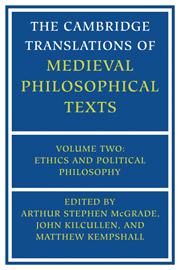Book contents
- Frontmatter
- Contents
- Preface
- General Introduction
- 1 ALBERT THE GREAT: Questions on Book X of the Ethics
- 2 BONAVENTURE: Conscience and Synderesis
- 3 GILES OF ROME: On the Rule of Princes (selections)
- 4 PETER OF AUVERGNE: Commentary and Questions on Book III of Aristotle's Politics (selections)
- 5 HENRY OF GHENT: Is It Rational for Someone without Hope of a Future Life to Choose to Die for the Commonwealth?
- 6 GODFREY OF FONTAINES: Does a Human Being Following the Dictates of Natural Reason Have to Judge that He Ought to Love God More than Himself?
- 7 JAMES OF VITERBO: Does a Human Being Have a Greater Natural Love for God than for Himself, or Vice Versa?
- 8 GODFREY OF FONTAINES: Reply to James of Viterbo on Love of God and Self
- 9 HENRY OF GHENT: Is a Subject Bound to Obey a Statute When It Is Not Evident that It Promotes the Common Utility?
- 10 GODFREY OF FONTAINES: Are Subjects Bound to Pay a Tax When the Need for It Is Not Evident?
- 11 JAMES OF VITERBO: Is It Better to Be Ruled by the Best Man than by the Best Laws?
- 12 JOHN OF NAPLES: Should a Christian King Use Unbelievers to Defend His Kingdom?
- 13 WILLIAM OF OCKHAM: Using and Enjoying
- 14 AUGUSTINE OF ANCONA: Summa on Ecclesiastical Power (selections)
- 15 WILLIAM OF OCKHAM: Is an Errant Individual Bound to Recant at the Rebuke of a Superior?
- 16 JEAN BURIDAN: Questions on Book X of the Ethics
- 17 JOHN WYCLIF: On Civil Lordship (selections)
- Index
2 - BONAVENTURE: Conscience and Synderesis
Published online by Cambridge University Press: 05 June 2012
- Frontmatter
- Contents
- Preface
- General Introduction
- 1 ALBERT THE GREAT: Questions on Book X of the Ethics
- 2 BONAVENTURE: Conscience and Synderesis
- 3 GILES OF ROME: On the Rule of Princes (selections)
- 4 PETER OF AUVERGNE: Commentary and Questions on Book III of Aristotle's Politics (selections)
- 5 HENRY OF GHENT: Is It Rational for Someone without Hope of a Future Life to Choose to Die for the Commonwealth?
- 6 GODFREY OF FONTAINES: Does a Human Being Following the Dictates of Natural Reason Have to Judge that He Ought to Love God More than Himself?
- 7 JAMES OF VITERBO: Does a Human Being Have a Greater Natural Love for God than for Himself, or Vice Versa?
- 8 GODFREY OF FONTAINES: Reply to James of Viterbo on Love of God and Self
- 9 HENRY OF GHENT: Is a Subject Bound to Obey a Statute When It Is Not Evident that It Promotes the Common Utility?
- 10 GODFREY OF FONTAINES: Are Subjects Bound to Pay a Tax When the Need for It Is Not Evident?
- 11 JAMES OF VITERBO: Is It Better to Be Ruled by the Best Man than by the Best Laws?
- 12 JOHN OF NAPLES: Should a Christian King Use Unbelievers to Defend His Kingdom?
- 13 WILLIAM OF OCKHAM: Using and Enjoying
- 14 AUGUSTINE OF ANCONA: Summa on Ecclesiastical Power (selections)
- 15 WILLIAM OF OCKHAM: Is an Errant Individual Bound to Recant at the Rebuke of a Superior?
- 16 JEAN BURIDAN: Questions on Book X of the Ethics
- 17 JOHN WYCLIF: On Civil Lordship (selections)
- Index
Summary
Introduction
Bonaventure was born John of Fidanza in Bagnoregio in Tuscany around 1217. He took the name Bonaventure on entering the Franciscan order in 1243, after completing studies at Paris for the Master of Arts degree. He studied theology with the major Franciscan masters at Paris 1243–48, lectured there on the Sentences of Peter Lombard from 1250 to 1252, and taught as the Franciscan regent master at Paris until he was elected Minister General of the order in 1257, a position he held until his death in 1274. He was made Cardinal Bishop of Albano in 1273 and participated in the Second Council of Lyons the following year. Bonaventure's disposition prompted some to declare that in him it seemed as if Adam had not sinned. He nevertheless earned the enmity of many of his confreres, who contended that it was imperative for Franciscans to follow a rigorously poor style of life and one innocent of academic culture. Bonaventure defended the importance of university studies against these members of his order and justified a rule of life sufficiently relaxed to allow pursuit of such studies. He was considered a reactionary by some of his university colleagues, however, because of his antagonism to the growing dominance of the teachings of Aristotle. His most celebrated work is a compact synthesis of intellect and devotion, The Journey of the Mind to God. A similar fusion is evident in his discourses On the Ten Commandments, On the Seven Gifts of the Holy Spirit, and On the Six Days of Creation.
- Type
- Chapter
- Information
- The Cambridge Translations of Medieval Philosophical Texts , pp. 169 - 199Publisher: Cambridge University PressPrint publication year: 2000

